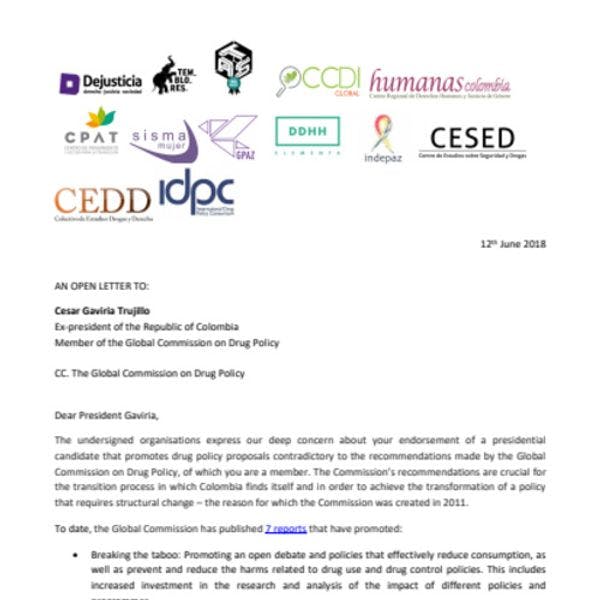Lettre ouverte à Cesar Gavira au sujet de l'élection à venir en Colombie
L’IDPC exprime ses préoccupations concernant le soutien donné par le Commissionnaire Gavira à un candidat à l’élection présidentielle dont les propositions en matière de politiques des drogues contrastent fortement avec celles de la Commission Globale de politiques en matière de drogues. Pour en savoir plus, en anglais, veuillez lire les informations ci-dessous.
AN OPEN LETTER TO:
Cesar Gaviria Trujillo
Ex-president of the Republic of Colombia
Member of the Global Commission on Drug Policy
CC. The Global Commission on Drug Policy
Dear President Gaviria,
The undersigned organisations express our deep concern about your endorsement of a presidential candidate that promotes drug policy proposals contradictory to the recommendations made by the Global Commission on Drug Policy, of which you are a member. The Commission’s recommendations are crucial for the transition process in which Colombia finds itself and in order to achieve the transformation of a policy that requires structural change – the reason for which the Commission was created in 2011.
To date, the Global Commission has published 7 reports that have promoted:
- Breaking the taboo: Promoting an open debate and policies that effectively reduce consumption, as well as prevent and reduce the harms related to drug use and drug control policies. This includes increased investment in the research and analysis of the impact of different policies and programmes.
- Replacing the criminalisation and punishment of people who use drugs with the provision of health services and treatment for those who need them, including harm reduction programmes.
- Eliminating criminal punishments for peasants and day laborers involved in the drug market by participating in the cultivation, processing, transportation or sale of drugs as a means of subsistence for their families; policies should instead focus on long-term socio-economic development efforts.
- Encouraging governments to experiment with models for the legal regulation of drugs (like cannabis) that are designed to undermine the power of organised crime and safeguard the health and safety of citizens.
The proposed drug policy included in the government programme that you – and the party which you lead — have publicly supported are contrary to the Global Commission’s recommendations and the evidence from available research. The proposal:
- Does not support drug policy change, although this is the reason for the existence of the Global Commission on Drug Policy.
- Opposes the core elements of point 4 in the peace agreement.
- Calls for the return of forced eradication strategies such as aerial spraying, which has proven to be ineffective in containing or reducing the cultivation of crops declared to be illicit.
- Fails to embrace harm reduction as a strategy to protect the health of people who use drugs, while the Commission’s recommendation, based on a public health approach, has been precisely the opposite.
- Proposes the prohibition of a ‘personal dose’, which in practice criminalises people who use drugs.
- Opposes voluntary crop substitution, while supporting the return of aerial fumigation and the implementation of hard-line policies towards growers, while the Commission has recommended reducing the harms related to drug control policies in rural areas.
- Does not agree with market regulation strategies, including that of medicinal cannabis.
It is also important to highlight that the Global Commission was explicitly included as an international monitor for the implementation of point four in the peace agreement between the government and FARC, which refers specifically to drug policy. This is particularly worrisome given that the government plan that you publicly support includes the revision and modification of point four of the accord.
We express deep concern that the positions that you have taken regarding drug policy in Colombia, despite your role as a member of the Global Commission on Drug Policy, weakens the role that the Commission may play with regards to the Colombian peace process.
We ask that you clarify your stance on the drug policy proposals made by the presidential candidate in question, that you state your position on these proposals, and consider whether that implies a change in your position with respect to those taken by the Global Commission on Drug Policy.
In conclusion, the peace process currently underway in Colombia necessitates a transformation of drug policy, along the lines of the recommendations provided by the Global Commission. The presidential candidate that you and your party have publicly supported contradicts everything that the Commission defends and proposes drug policies whose effectiveness have proven to be counterproductive for the protection and the guarantee of human rights of the people involved in illegal economies.
The civil society organizations listed below as signatories will continue working to support peace in Colombia, accompanied by a transformation in drug policy that is consistent with human rights, health, development and social justice.
Téléchargements
Sujets
Régions
Profils associés
- International Drug Policy Consortium (IDPC)
- Global Commission on Drug Policy
- Elementa, Consultoría en Derechos
- Dejusticia
- Corporación Humanas Colombia
- Colectivo de Estudios Drogas y Derecho (CEDD)
- Acción Técnica Social (ATS)
- Corporación Viso Mutop
